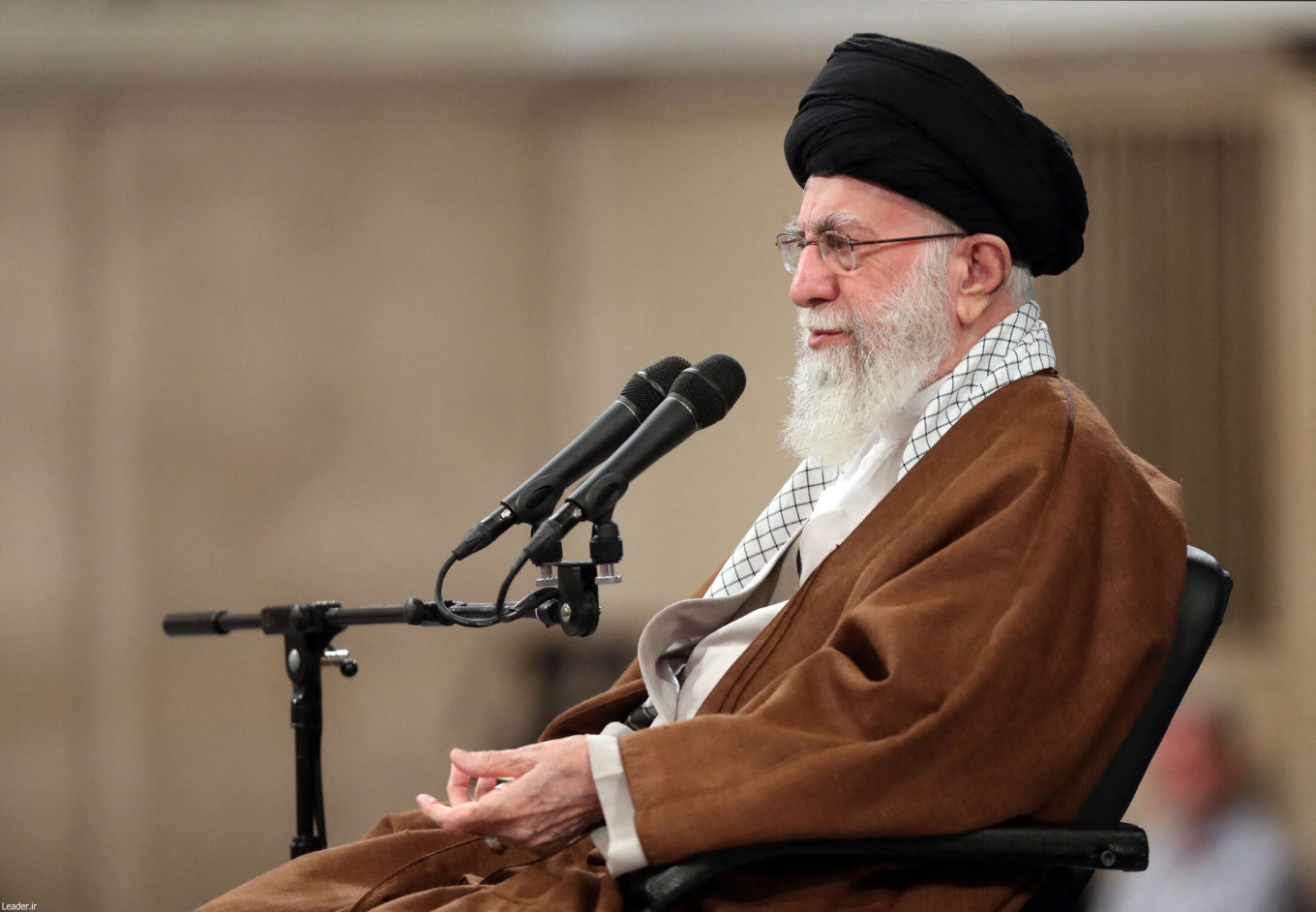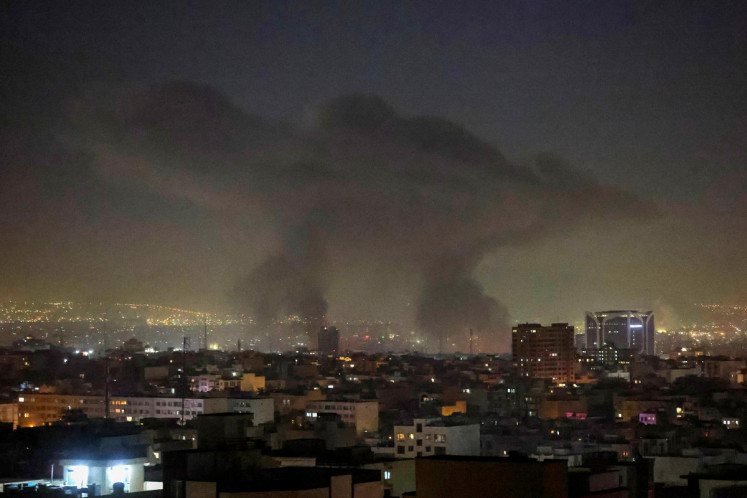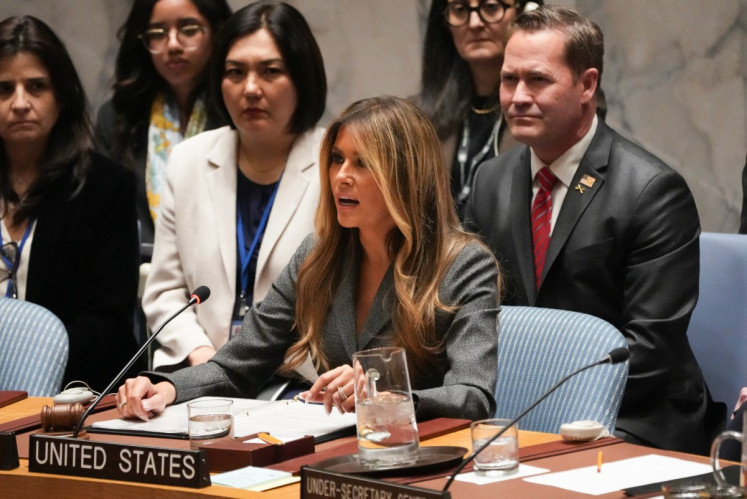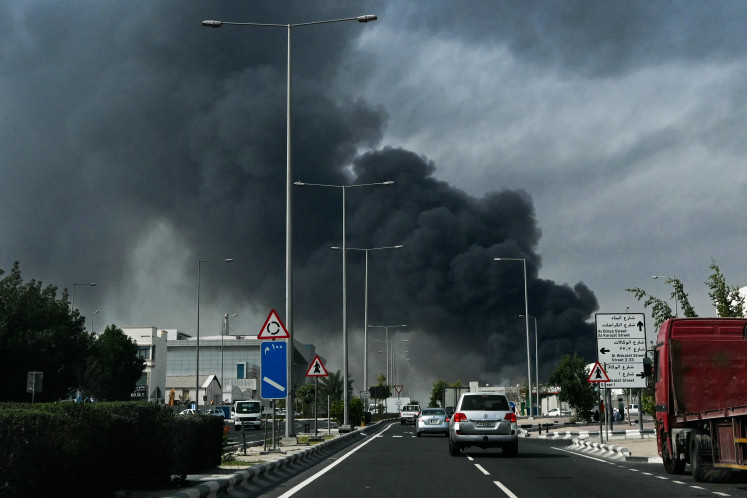Popular Reads
Top Results
Can't find what you're looking for?
View all search resultsPopular Reads
Top Results
Can't find what you're looking for?
View all search resultsIran says won't negotiate under 'intimidation' as Trump ramps up pressure
Iran's mission to the United Nations had indicated Sunday that Tehran might be open to talks aimed at addressing US concerns about the potential militarisation of its nuclear programme -- though not to ending the program completely.
Change text size
Gift Premium Articles
to Anyone
 A handout picture provided by the office of Iran's Supreme Leader Ayatollah Ali Khamenei on May 19, 2024, shows him speaking during meeting of members of the Revolutionary Guards in Tehran. Iran was thrown into uncertainty on May 19, 2024 as search and rescue teams scoured a fog-shrouded mountain area after President Ebrahim Raisi's helicopter went missing in what state media described as an “accident“. (AFP/Handout/Khamenei.ir/-)
A handout picture provided by the office of Iran's Supreme Leader Ayatollah Ali Khamenei on May 19, 2024, shows him speaking during meeting of members of the Revolutionary Guards in Tehran. Iran was thrown into uncertainty on May 19, 2024 as search and rescue teams scoured a fog-shrouded mountain area after President Ebrahim Raisi's helicopter went missing in what state media described as an “accident“. (AFP/Handout/Khamenei.ir/-)
I
ran said Monday it would not negotiate under "intimidation", after US President Donald Trump sought to ratchet up pressure on Tehran by ending a sanctions waiver that had allowed Iraq to buy electricity from its Shiite neighbour.
Iran's mission to the United Nations had indicated Sunday that Tehran might be open to talks aimed at addressing US concerns about the potential militarisation of its nuclear programme -- though not to ending the program completely.
But on Monday, Iran's top diplomat seemed to slam the door on such discussions, saying Tehran's nuclear programme was and always will be entirely peaceful and so there was "no such thing as its 'potential militarization'".
"We will NOT negotiate under pressure and intimidation. We will NOT even consider it, no matter what the subject may be," foreign minister Abbas Araghchi said on social media platform X.
Since returning to the White House in January, Trump has reinstated his policy of exerting "maximum pressure" against Iran, reimposing sweeping sanctions aimed at crushing its oil industry in particular.
The US State Department said Sunday the decision not to renew Iraq's sanctions waiver was made to "ensure we do not allow Iran any degree of economic or financial relief."
Iran supplies a third of Iraq's gas and electricity, providing Tehran with substantial income.
On Sunday, the Iranian mission to the United Nations had sounded a more conciliatory note, suggested Tehran might be willing to discuss certain issues.
"If the objective of negotiations is to address concerns vis-a-vis any potential militarization of Iran's nuclear program, such discussions may be subject to consideration," said a statement from the mission.
"However, should the aim be the dismantlement of Iran's peaceful nuclear program to claim that what (President Barack) Obama failed to achieve has now been accomplished, such negotiations will never take place," it said.
The waiver for Iraq was introduced in 2018, when Washington reimposed sanctions on Tehran after Trump abandoned a nuclear deal with Iran negotiated under Obama.
A spokesman for the US embassy in Baghdad on Sunday urged Baghdad "to eliminate its dependence on Iranian sources of energy as soon as possible."
"The President's maximum pressure campaign is designed to end Iran's nuclear threat, curtail its ballistic missile program, and stop it from supporting terrorist groups," the spokesman said.
The landmark 2015 deal that Obama helped negotiate between Tehran and major powers promised sanctions relief in return for Iran curbing its nuclear programme.
Tehran, which denies seeking nuclear weapons, initially adhered to the nuclear deal after Trump pulled out of it, but then rolled back commitments.
US officials estimate Iran would now need mere weeks to build a nuclear bomb if it chose to.
Trump pulled out of the agreement over the objections of European allies, instead imposing US sanctions on any other country buying Iran's oil. The waiver was extended to Iraq as a "key partner" of the United States.
Iraq, despite having immense oil and gas reserves, remains dependent on such energy imports. But Baghdad said it had prepared "for all scenarios" regarding the waiver.
The ending of the energy waiver is expected to worsen the power shortages that affect the daily lives of 46 million Iraqis.
Gulf analyst Yesar Al-Maleki of the Middle East Economic Survey said Iraq will now face challenges in providing electricity, especially during summer.
To alleviate the impact, Iraq has several options including increasing imports from Turkey.









